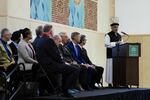As Portland’s Muslim communities prepare to observe Ramadan this week, many are adapting the way they celebrate the month-long holiday to adhere to statewide stay-at-home and social distancing orders.
Harris Zafar, a national spokesman for the Ahmadiyya Muslim Community, appeared on OPB’s "Think Out Loud" as Muslim families prepare to observe Islam’s holy month. He said it’s important that people within the faith celebrate through troubling times.
“Lean on your faith right now. Although we’re in unprecedented times — we cannot gather anymore at mosques for our daily prayers, for the weekly Friday prayer service — your faith is going to get you through this,” Zafar said.
Ramadan typically involves gatherings of hundreds of people. Now, families and individuals are finding ways to observe the holiday from home.
“Treat your home as a mosque. ... [Make] sure that we’re connected to our faith, while also [being] virtually connected to each other as humans through online resources like Zoom or Skype calls,” Zafar suggested. “That’s what we’re relying on to make sure that not only financially and physically and medically, but also emotionally and spiritually we have the support we need to get through this.”
Like many small businesses in Oregon, Muslim entrepreneurs have also suffered devastating losses following mass closures. Sajal Hubbs, owner of Bollywood Eyebrows, said she laid off eight employees since closing her doors in March. Now she has no source of income.
“I work very hard to build these businesses,” Hubbs said. “I’m struggling to figure out how to survive — I have applied for all the loans they’re offering, and unfortunately I just keep getting denials.”
One of the employees she was forced to lay off, a friend from Yemen, now lives with her.
“Being an immigrant, she’s refused from most of the help she applied for because she has a green card,” Hubbs said. “Currently she’s living with me. So I’m trying to help her as well as take care of myself.”

Muslim Educational Trust president and co-founder Wajdi Said speaks at the Muslim Educational Trust in Tigard, Ore., March 15, 2019.
Meerah Powell / OPB
Some relief can be found for those struggling — the Muslim Educational Trust, which provides educational, social and spiritual needs for the Muslim community, is helping provide food and financial assistance. In any given month the organization supported 75 to 100 families; now, the organization is supporting over 825 Oregon families.
Wajdi Said, the organization’s co-founder, said he’s witnessed a spike in Islamophobia within Muslims of East Asian descent amid the outbreak. Said called for elected leaders to provide better support for marginalized communities.
"It is very important in times of crisis to support the immigrant and refugee communities, in addition to the challenges that our Native American, African-American and Latinos are facing today.”
